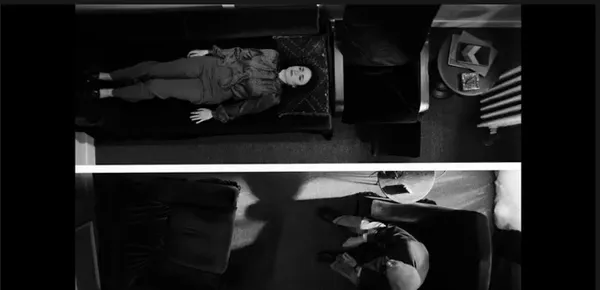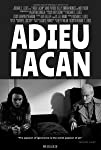Eye For Film >> Movies >> Adieu, Lacan (2022) Film Review
Adieu, Lacan
Reviewed by: Anne-Katrin Titze

“Now she has stopped being against herself” concludes the analyst (David Patrick Kelly, resembling at times Sam Shepard, Samuel Beckett or John Huston) about Seriema (Ismenia Mendes) when it is time to say adieu Lacan. The journey to this point is the journey of the film, one session at a time, some shorter, some longer, as was the style for Jacques Lacan, one of the most original thinkers of the 20th century.
Adieu Lacan (Adieu, Lacan), based on the book The Parrot And The Doctor, aka Lacan’s Parrot, and the play Goodbye, Doctor by Betty Milan, who was in analysis with Lacan in the 1970s in Paris, addresses a number of vital issues that are as relevant today as they were then. Director Richard Ledes and cinematographer Valentina Caniglia use the camera in this black and white movie to explore, at times in amusing ways, the power dynamics at play.

Seriema arriving in Paris from her native Brazil does not want to disclose her Lebanese ancestry. “I lost a child twice,” she says, as though it were the same child over again. Words are all important and why she chose analysis in a language not her own, one that, as she says, “continually forces me to think” form the central puzzle. The words in French are opaque to her, they “don’t take me back to anything.” They are like things and essential in figuring out the connection to the name of the father.
She has no trouble calling out the doctor when she overhears him in the next room calling her “the little Brazilian woman” to his assistant. “The French love the noble savage” she throws at him early on, something her Lebanese grandmother never would have done. She believed in fate and destiny and in the magical fetish her granddaughter wears as a pendant around her neck at all times to keep her safe from people’s envy. Lacan, of course, is onboard with that object and Ledes even has the analyst perform a shamanistic dance when nobody watches but the audience.
This Lacan keeps ritualistically saying “I’m listening” during the sessions, while his body language and facial expressions shift from devilish grin to deep concern to fatigue with the changing light. Knowing that “ancestors return, they don’t cease to exist” and freeing yourself from the father’s desire go hand-in-hand.
The costume design by Kathryn O'Reardon is intricate and thought-provoking, with Lacan oscillating between the extremes of buttoned-up shirts, complete with an extra throat latch (hinting at the tab collar of priests?) to a dressing gown and house slippers. Seriema also signals protection and personal style with the pants and blouses (one with a pussy bow during a tense session), displaying her state of mind as far as the “sealing of the body” is concerned. It is a decision we all make every day getting dressed.
“You can get on a new path, reinvent your own history” - that’s the promise.
Reviewed on: 27 May 2022
















